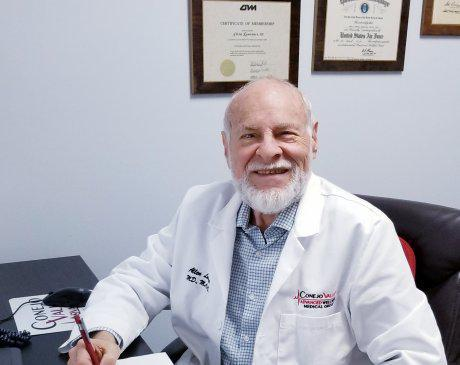- 21103 Vanowen St Woodland Hills, CA 91303 | Call us today!
- 310-879-9266
What Are the Absolute and Relative Contraindications for TRT Therapy?

While it is true that Testosterone Replacement Therapy a few potential, relative contraindications, that is that it may be necessary to avoid or use carefully for some people who have certain health problem wherein testosterone could possibly make them worse, it is also true that testosterone replacement therapy may be absolutely contraindication in some men where complete avoidance is definitely recommended. As a physician I always watch for these problems and when they are meaningful I tell patients that they should not use TRT. Fortunately, most contraindications to using TRT are relative, that is, they are only contraindications: 1) if the individual has one or more conditions that can create a problem, or 2) the individual may still use TRT, if that problem which is a relative contraindication is under full and total control, well managed, well treated and use of testosterone will not make it worse. Absolute problems, while few are problems because they cannot necessarily be well controlled, well managed, or even appropriately treated.
Contraindications for TRT will vary depending on an individual’s medical history, family history, and genetic makeup. Some common absolute and relative contraindications are:
Absolute Contraindications:
- Allergies or Hypersensitivity: Anyone with known allergy or hypersensitivity to testosterone or any of the components in TRT medications should 100% avoid it.
- Pregnancy or Breastfeeding: TRT is often given to women and should never be used in pregnant or breastfeeding women, it can have masculinizing effects on a developing fetus or nursing infant. This is only mentioned here for completeness incase a woman reads this and needs to know this.
- Androgen-Sensitive (or Androgen-Dependent) Prostate Cancer:
- These cancers require androgens, such as testosterone, to grow and proliferate. Androgens bind to androgen receptors in the prostate cancer cells, promoting tumor growth.
- Hence, testosterone will stimulate their growth and this can be a huge problem
- Androgen Deprivation Therapy (ADT), which reduces the levels of androgens or blocks their action, is typically effective in managing androgen-sensitive prostate cancer. This can be achieved through medications (e.g., GnRH agonists or antagonists) or surgical castration (orchiectomy) also by not using TRT.
- Castration-Resistant Prostate Cancer (CRPC):
- These cancers continue to grow and progress despite the reduction of androgens to very low levels (castrate levels). Initially, these cancers were sensitive to androgens, but over time, they adapted and became resistant to ADT.
- CRPC can develop through various mechanisms, such as upregulation of androgen receptors, mutations in androgen receptors, or the ability of cancer cells to produce their own androgens.
- Management of CRPC often involves second-line hormonal therapies (e.g., abiraterone, enzalutamide) that more effectively inhibit androgen receptor signaling, as well as chemotherapy, immunotherapy, or targeted therapy.
- Breast Cancer in men: Similarly, men with current or past breast cancer may be advised against TRT due to concerns about the hormone’s impact on breast tissue.
- While testosterone is not typically a primary focus in the classification and treatment of male breast cancer, androgens can still play a role. There are some nuances:
- Androgen Receptor (ARE) Status: Some breast cancers express androgen receptors. The role of androgens and androgen receptors in breast cancer is complex and not as well understood as estrogen and progesterone receptors.
- In some cases, androgen receptor status can influence the behavior of the cancer and potentially its treatment, though this is a more emerging area of research.
- There is limited evidence to suggest that testosterone can directly drive the growth of some male breast cancers. However, research is ongoing to understand the full impact of androgens and androgen receptors in breast cancer biology.
- While testosterone is not typically a primary focus in the classification and treatment of male breast cancer, androgens can still play a role. There are some nuances:
Relative Contraindications:
- Prostate Cancer: If a person has active prostate cancer or a history of it, TRT is usually not recommended, as testosterone can potentially stimulate the growth of prostate cancer cells. If genetic testing is done and the oncologist believes the individuals prostate cancer is not testosterone sensitive then testosterone may be used.
- Breast Cancer: If a person has active prostate cancer or a history of it, TRT is usually not recommended, as testosterone can potentially stimulate the growth of prostate cancer cells. If genetic testing is done and the oncologist believes the individuals prostate cancer is not testosterone sensitive then testosterone may be used.
- Erythrocytosis, High Red Blood Cell Count: TRT can ‘sometimes’ lead to an increase in red blood cell production, which might be problematic for people with conditions like polycythemia.
- Since the treatment of elevated red blood cells is so simple “donating blood” or phlebotomy (withdrawing blood and disposing of it) a trail of testosterone can be offered if red blood cells can be simply managed and or treated then the patient should we carefully watched but may used testosterone fro treating andropause.
- If someone has uncontrolled erythrocytosis (an abnormal increase in red blood cell production), TRT could exacerbate this condition.
- Sleep Apnea: TRT can worsen sleep apnea in some cases, so individuals with severe sleep apnea might need to explore alternative treatments. Severe sleep apnea may become a contraindication.
- Heart Conditions: If someone has a history of heart problems or severe cardiovascular disease, TRT may not be recommended, as it can impact cholesterol levels and potentially increase the risk of heart issues. Severe heart conditions may become a contraindication. The decision as to whether to use or not use testosterone may best be made by the specialists managing the patient’s conditions.
- Liver or Kidney Disease: People with mild liver or kidney disease may have difficulty metabolizing and clearing testosterone, so TRT might not be advisable for them. Moderate to severe liver or kidney disease may become a contraindication. The decision as to whether to use or not use testosterone may best be made by the specialists managing the patient’s conditions.
It’s crucial for the patient to have a thorough discussion with his healthcare providers who are taking care of him for the questionable condition so that they can evaluate his specific medical history and assess whether TRT is a safe and appropriate option for him at the time he needs it. His treating physicians can best help him weigh the potential benefits for and the risks against, and decide if testosterone is okay or not, it is contraindicated. It is essential to read the informed consent and make an informed decision.

Article by Dr. Allen Lawrence, M.A., M.D., Ph.D.




